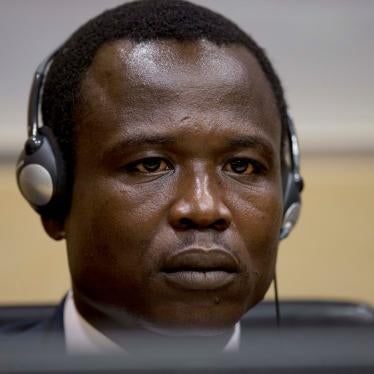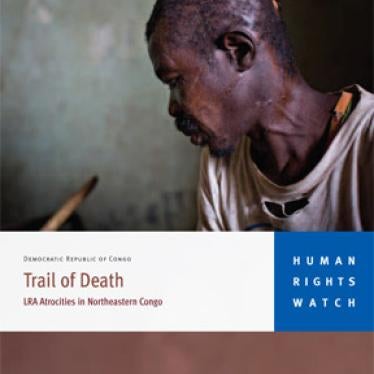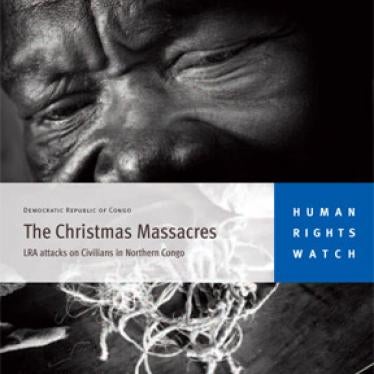34 civil society, human rights, and religious groups in northern Congo, Central African Republic, and Southern Sudan write to President Obama, calling for urgent implementation of the new strategy released by the US government last month on tackling the problem of the Lord's Resistance Army (LRA).
This is not a letter from Human Rights Watch, but we believe it is particularly powerful, especially as we remember the "Christmas massacres" perpetrated by the LRA over the past two years.
December 21, 2010
President Barack Obama
The White House
1600 Pennsylvania Avenue, NW
Washington, DC 20500
CC:
H.E. Joseph Kabila, President of the Democratic Republic of Congo
H.E. François Bozize, President of the Central African Republic
H.E. Omar al-Bashir, President of Sudan
H.E. Salva Kiir, President of the Government of Southern Sudan
Urgent appeal from central African civil society on ending the menace of the Lord's Resistance Army
Your Excellency:
As the representatives of 34 civil society, human rights, and religious groups in the LRA-affected areas of northern Congo, Central African Republic, and Southern Sudan, we are writing to ask you to urgently implement the new strategy that the US government released last month on tackling the problem of the Lord's Resistance Army (LRA). Without implementation of the strategy, the words on paper will remain meaningless and many of us, who live with the daily threat of the LRA, will continue to suffer.
Each day that goes by without a solution to the problem of the LRA is another day of terror and pain for those of us living under constant threat of renewed attacks. Already, the LRA has brutally killed more than 2,300 of our family members and abducted over 3,000 others since they began their latest wave of killings in September 2008. Many of our children are still in the hands of the LRA. We do not know if they are alive or dead. Those who have managed to escape the LRA bear the physical and mental scars of what they have suffered and will never be the same again. We have few means to help them re-adjust and integrate back into our communities, but we are trying to do what we can.
With over 400,000 people displaced from their homes, our lives are not easy. We no longer have access to our fields, our schools are not functioning, and we struggle to fight off diseases and to find enough food to feed our families.
In this month of December, we are particularly afraid of more attacks by the LRA. We remember the Christmas massacres of 2008, when the LRA killed at least 865 civilians during the Christmas period, and the Makombo massacre of December 2009, when 345 civilians were killed. During these attacks, our family members were killed in unimaginably savage ways: their heads crushed with clubs or machetes; their faces disfigured; and their genitals, mouths, ears, legs and arms cut off, for no reason other than to terrorize. At this time of the year, when we should be celebrating Christmas, we instead mourn our loved ones and we live each day in fear of more LRA attacks.
Your excellency, we fully agree with the strategy's overall goal for the people of central Africa to be "free from the threat of LRA violence and have the freedom to pursue their livelihoods." We also welcome the strategy's four strategic objectives to: a) increase protection of civilians; b) apprehend or remove from the battlefield Joseph Kony and senior commanders; c) promote the defection, disarmament, demobilization, and reintegration of remaining LRA fighters; and d) increase humanitarian access and provide continued relief to affected communities.
We also appreciate the commitment in the strategy to transitional justice and rebuilding of war-affected communities in Uganda. In northern Uganda, communities are still struggling to overcome the legacy of the war, in which tens of thousands of people were abducted by the LRA and more than 1.6 million displaced during the conflict.
We appreciate your recognition that a combination of both military and non-military components are required and that resolving the LRA problem will require coordination and participation from a wide array of regional, multilateral, and international partners.
Please, do not delay a day longer in implementing this strategy. We implore you to find the financial resources and the political will to turn the goals and objectives of this strategy into reality. For us, this is a matter of life and death.
In particular, we urge you to prioritize the protection of our communities at risk of continued LRA attacks. While the presence of UN peacekeepers has given some help, it has been not nearly enough. For example, in northern Congo's Haut Uele District, MONUSCO peacekeepers provide some protection in certain communities, but there are currently no peacekeepers in northern Congo's Bas Uele District (Congo), one of the areas worst affected by LRA attacks. Where peacekeepers are deployed, they rarely leave their bases and have sometimes proven unable - or unwilling - to prevent or respond to LRA attacks less than a kilometer from their bases. This was the case in both Ngilima and Duru, two towns with a MONUSCO presence that have suffered numerous attacks in recent months. The UN missions in CAR (MINURCAT and BINUCA) and Sudan (UNMIS/UNAMID) are also not focused on the LRA problem, and have few or no peacekeepers deployed in LRA-affected areas.
We appreciate your recognition that a lack of communications infrastructure and good roads has made it difficult for us to report on attacks in a timely way or send out calls for help. We are glad that support in this area has been identified as a priority action in your strategy. We hope this will include urgent efforts to expand cell phone coverage in the LRA affected areas, to implement early warning systems through HF radios, and to rehabilitate key roads and airstrips.
We fully agree that the LRA problem in our communities will not be resolved until Joseph Kony and the other senior leaders are captured and brought to justice. As long as the LRA's top leaders evade capture, we fear they will only continue to abduct our children, who in turn will be trained to replace any lower and mid-level combatants who escape, defect, or are killed.
Efforts to pursue the LRA have relied on our own national armies, but to date this has not attained the expected objectives. The LRA rebels continue to carry out killings and other abuses against civilians and this rebellion has still not been eradicated. The leaders of the LRA are still on the run and have intensified their modus operandi. We invite you to consider other options, such as a significant reinforcement of our respective armies' operational capacity (logistically) and support by an army from a country with experience of this type of guerrilla warfare, with the principal objective being the capture of Joseph Kony and his remaining henchmen to be brought to international justice. We hope that you will work together to advance this idea.
We also ask that international sanctions be imposed on any government or person identified as supporting the LRA.
We have suffered so much from a war that is not our own and have often felt forgotten and ignored by our own governments and by the international community. This new strategy has given us hope. We implore you to implement it and to begin those efforts today.
Yours sincerely,
Representatives of the following 34 civil society, human rights, and religious groups in the LRA-affected areas of northern Congo, Central African Republic, and Southern Sudan:
Organizations from northern Congo:
- Action pour le développement et le Bien-être social (ADEBES), Faradje
- AOG, Niangara
- Association ASSAHU, Niangara
- Association des Déplacés, Niangara
- Association des Pécheurs, Niangara
- Association Féminines pour la Promotion de Femmes d'Ango
- CDJP, Haut Uélé
- Centre d'Accompagnement des Femmes et Enfants Vulnérables (CAFEV), Dungu
- COMICO, Niangara
- Commission Justice et Paix, Haut Uélé
- Conscience, Dungu
- Croix Rouge, Niangara
- FEC, Niangara
- FEPACO, Niangara
- L'église Catholique, Niangara
- L'église CECA 20, Niangara
- L'Église CECA 16, Niangara
- L'église Kimbanguiste, Niangara
- La Coordination de la Société Civile du Territoire du Dungu
- Paix et Droit de l'Homme Aujourd'hui (PDHA), Haut Uélé
- REGED, Niangara
- Réseau de Défense de Droits Humains à Niangara
- Société Civile d'Ango
- Société Civile de Niangara
- SODENIA, Niangara
- Union des Déplaces d'Ango
- VTO, Niangara
Organizations from CAR:
- La Coalition Centrafricaine pour la CPI
- Le Réseau des ONGs des Droits de l'Homme en Centrafrique
- Vitalité Plus
Religious Representatives from Southern Sudan:
- Rt. Rev. Peter Munde Yacoub, ECS Bishop of Yambio Diocese
- Rt. Rev. Wilson E. Kamani, ECS Bishop of Ibba Diocese
- Rt. Rev.Bismark M. Avokaya, ECS Bishop of Mundri Diocese
- Rt. Rev. Samuel Enosa Peni, ECS Bishop of Nzara Diocese







